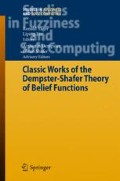Abstract
We are concerned here with the problem of selecting an optimal alternative in situations in which there exists some uncertainty in our knowledge of the state of the world. We show how the Dempster–Shafer belief structure provides a unifying framework for representing various types of uncertainties. We also show how the OWA aggregation operators provide a unifying framework for decision making under ignorance. In particular we see how these operators provide a formulation of a type epistemic probabilities associated with our degree of optimism.
Access this chapter
Tax calculation will be finalised at checkout
Purchases are for personal use only
Preview
Unable to display preview. Download preview PDF.
References
A. P. Dempster, “Upper and lower probabilities induced by a multi-valued mapping.” Ann. of Mathematical Statistics, 1967, pp. 325–339.
G. A. Shafer, Mathematical Theory of Evidence. Princeton University Press, Princeton, N.J., 1976.
R. R. Yager, “On ordered weighted averaging aggregation operators in multi-criteria decision making.” IEEE Trans. on Systems, Man and Cybernetics, 18, 1988, pp. 83–190.
R. R. Yager, “A general approach to decision making with evidential knowledge.” In: Uncertainty in Artificial Intelligence, edited by L. N. Kanal and J. L. Lemmer, North-Holland, Amsterdam, 1986, pp. 317–330.
R. R. Yager, “Optimal alternative selection in the face of evidential knowledge.” In: Optimization Models using Fuzzy Sets and Possibility Theory, edited by J. Kacprzyk and S. A. Orlovski, D. Reidel, Dordrecht, 1987, pp. 123–140.
S. B. Richmond, Operations Research for Management Decisions, Ronald Press, New York, 1968.
M. J. Bolanos, M. T. Lamata and S. Moral, “Decision making problems in a general environment.” Fuzzy Sets and Systems, 25, 1988, pp. 135–144.
D. Dubois and H. Prade, “Evidence measures based on fuzzy information.” Automatica, 21, 1985, pp. 547–562.
J. Y. Jaffray, “Application of linear utility theory to belief functions.” In: Uncertainty and Intelligent Systems, edited by B. Bouchon, L. Saitta and R. R. Yager, Springer-Verlag, Berlin, 1988, pp. 1–8.
T. M. Strat, “Making decisions with belief functions.” Proceedings Fifth Workshop on Uncertainty in Artificial Intelligence, Windsor, Ont., 1989, pp. 351–360.
R. R. Yager, “Applications and extensions of OWA aggregations.” Int. J. of Man-Machine Studies (to appear).
M. O’Hagan, ‘Aggregating template rule antecedents in real-time expert systems with fuzzy set logic.” Int. J. of Man-Machine Studies, (to appear).
J. Gordon and E. H. Shortliffe, “The Dempster–Shafer theory of evidence.” In: Rule-Based Expert Systems: the MYCIN Experiments of the Stanford Heuristic Programming Project, edited by B. G. Buchanan and E. H. Shortliffe, Addison Wesley, 1984, pp. 272–292.
J. Gordon and E. H. Shortliffe, “A method for managing evidential reasoning in a hierarchical hypothesis space.” Artificial Intelligence, 26, 1985, pp. 323–357.
J. D. Lowrance and T. D. Garvey, “Evidential reasoning: A developing concept.” In: IEEE Int. Conf. on Cybernetics and Society, Seattle, WA, 1982, pp. 6–9.
J. D. Lowrance, T. D. Garvey and T. M. Strat, “A framework for evidential-reasoning systems.” Proceedings of the 5th National Conference on Artificial Intelligence (AAAI), Philadelphia, 1986, pp. 896–903.
V. Quiggin, “A theory of anticipated utility.” J. of Economic Behavior and Organization, 3, 1982, pp. 323–343.
Editor information
Editors and Affiliations
Rights and permissions
Copyright information
© 2008 Springer-Verlag Berlin Heidelberg
About this chapter
Cite this chapter
Yager, R.R. (2008). Decision Making Under Dempster–Shafer Uncertainties. In: Yager, R.R., Liu, L. (eds) Classic Works of the Dempster-Shafer Theory of Belief Functions. Studies in Fuzziness and Soft Computing, vol 219. Springer, Berlin, Heidelberg. https://doi.org/10.1007/978-3-540-44792-4_24
Download citation
DOI: https://doi.org/10.1007/978-3-540-44792-4_24
Publisher Name: Springer, Berlin, Heidelberg
Print ISBN: 978-3-540-25381-5
Online ISBN: 978-3-540-44792-4
eBook Packages: EngineeringEngineering (R0)

